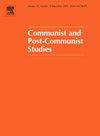从宪法认同到宪法认同
IF 1.3
4区 社会学
Q3 INTERNATIONAL RELATIONS
Communist and Post-Communist Studies
Pub Date : 2021-06-01
DOI:10.1525/J.POSTCOMSTUD.2021.54.1-2.176
引用次数: 1
摘要
近年来,俄罗斯宪法法院(Constitutional Court)的主要成员将宪法认同的概念适应了俄罗斯的法律背景,以解释俄罗斯在弗拉基米尔•普京(Vladimir Putin)总统领导下的威权主义转向,并使其合法化。这一发展反映了国际政治中一个更广泛的趋势,即民粹主义和反民主领导人试图确定可以转化为国内和国际一级法律和法律实践的“国家特征”,以否认或限制某些基本原则,如法治和/或人权。在俄罗斯,几位官员和政策制定者,其中包括宪法法院首席大法官瓦列里·佐尔金(Valery Zorkin, 2018年),为这一讨论做出了贡献。我们认为,俄罗斯法院一方面使用宪法认同话语来解释俄罗斯国家与国际法之间的具体关系,另一方面解释俄罗斯国家与其主体之间的关系。我们将这场辩论置于更广泛的法律和政治背景下,并强调它如何符合2020年春季推出的俄罗斯宪法修正案。本文章由计算机程序翻译,如有差异,请以英文原文为准。
From Constitutional Identity to the Identity of the Constitution
In recent years, leading members of Russia’s Constitutional Court have adapted the concept of constitutional identity to the Russian legal context, to explain and legitimize the country’s authoritarian turn under President Vladimir Putin. This development reflects a broader trend in international politics, where populist and anti-democratic leaders seek to identify “national characteristics” that can be translated into law and legal practices on the domestic as well as international level, in order to deny or restrict certain basic principles such as the rule of law and/or human rights. In Russia, several officials and policy makers, among them Chief Justice of the Constitutional Court Valery Zorkin (2018), have contributed to this discussion. We argue that a constitutional identity discourse has been used by Russian courts to explain the specific relationship between the Russian state and international law on the one hand, and on the other the relationship between the Russian state and its subjects. We place this debate in its wider legal and political context and highlight how it conforms with the amendments to the Russian constitution introduced in spring 2020.
求助全文
通过发布文献求助,成功后即可免费获取论文全文。
去求助
来源期刊

Communist and Post-Communist Studies
Multiple-
CiteScore
1.90
自引率
0.00%
发文量
23
期刊介绍:
Communist and Post-Communist Studies is an international journal covering all communist and post-communist states and communist movements, including both their domestic policies and their international relations. It is focused on the analysis of historical as well as current developments in the communist and post-communist world, including ideology, economy and society. It also aims to provide comparative foci on a given subject by inviting comments of a comparative character from scholars specializing in the same subject matter but in different countries.
 求助内容:
求助内容: 应助结果提醒方式:
应助结果提醒方式:


